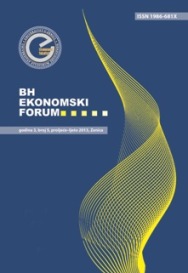ANTIKRIZNE POLITIKE I NJIHOVI EFEKTI U BOSNI I HERCEGOVINI
ANTI-RECESSION PROGRAMS AND THEIR EFFECTS IN BOSNIA AND HERZEGOVINA
Author(s): Adnan Duraković, Sabina DurakovićSubject(s): Economy, National Economy, Supranational / Global Economy, Public Finances
Published by: Ekonomski fakultet - Univerzitet u Zenici
Keywords: global economic crisis; antirecession measures; monetary policy; fiscal policy;
Summary/Abstract: “Anti-crisis policies and their effects in Bosnia and Herzegovina” is a paper that deals primarily with the research and analysis of theoretical and implemented ways of overcoming the negative consequences of the global economic crisis (in different countries) and their existence, efficiency and scope in the circumstances which are primarily nation specific. In countries like Bosnia and Herzegovina with accumulated economic problems such as high unemployment, divided economic space, large public administration, indebtedness, unequal social distribution, low investment level, numerous political disagreements and increased social stratification, the issue of crisis severity, as well as the question of who and how, to what extent and with what goals pursues certain anti-crisis policies can give a better insight into the real conditions and possibilities of an economy to change for the better. The paper deals with the causes, manifestations and consequences of the global crisis, as well as with the offered economic solutions from some of the most developed countries in the world as well as those in development, but with main focus on the countries of the Western Balkans and Bosnia and Herzegovina. This research lies upon a critical theorethical analysis of implemented anti recessionary measures using the SWOT matrix, while the influence of the key measurable tools of fiscal and monetary policy on the basic economic indicators was tested by the multiple regression model in the empirical part of the work. The results of both theoretical and empirical analysis indicate that there is the need for changing the crisis and development priorities, as well as the tools of economic policies since their scope has proved to be very limited.
Journal: BH ekonomski forum
- Issue Year: 2018
- Issue No: 8
- Page Range: 27-47
- Page Count: 21
- Language: Bosnian

